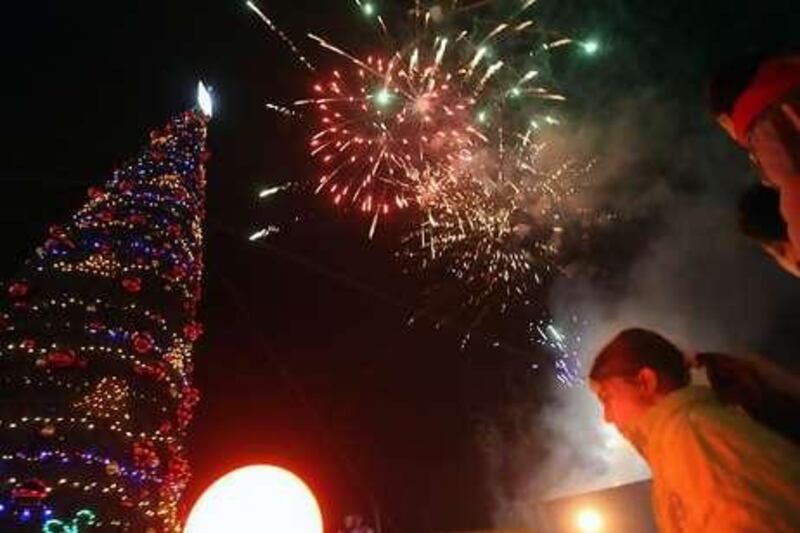Fuheis, Jordan // Christians are gearing up for a bit of holiday cheer. A brightly lit Christmas tree, the largest in Jordan, was set up last week in Fuheis, reflecting Christmas spirit in this Muslim country, where Christians make up less than four per cent of the country's 5.8 million population. Streets and homes are also decorated with flickering lights, and a Christmas festival, the first of its kind, was kicked off a few days ago in Fuheis, a predominantly Christian town, about 20 kilometres north of Amman. A procession of Christian youth singing hymns and Christmas carols on Christmas Eve tonight is part of the week-long festivities. But the Christians of Jordan are a dwindling community just as in neighbouring countries in what many fear is the emptying of the Holy Land of indigenous Christians, who trace their roots to ancient Arab tribes that inhabited the region before the fifth century. King Abdullah II has repeatedly expressed concern about the dwindling presence of Christians in the Holy Land. Prominent Christians said the king told them years ago in meetings that he cannot imagine a Holy Land without Christians. While sectarian violence continues to rattle Iraq, forcing many Christians to flee, and in Egypt sectarian tensions have heightened this year, and Lebanon is still plagued by Muslim-Christian tensions, in Jordan, Christians are not threatened and they live with Muslims in harmony, for the most part, as Jordan prides itself on its religious tolerance. But just like other countries in the region, many Christians emigrated for economic reasons and because of regional uncertainty since the Naqba, or Palestinian catastrophe, of 1948 cast its dark shadow on the Middle East. Well before that, in the early 19th century, Christian families started emigrating to South America. With the lower birth rate in Christian families, the departure of their members is felt more significantly in the community. "Almost every Christian family has relatives abroad? because our numbers are limited; any migratory wave is deeply felt although many Muslims too have emigrated and live in the diaspora," said Raouf Abujaber, a historian and the chairman of the Orthodox Council in Jordan and Palestine. "The unstable conditions in the last 60 years have caused many people to migrate. They have been emigrating since the early 19th century and it is an ongoing process." The rising tide of Islamism in the region has also become a source of concern for Christian families. However, Father Nabeel Haddad, the executive director of the Jordanian Interfaith Coexistence Research Centre, said: "Christians should not be more concerned about their future amid the ascendancy of extremist Islam in the region more than moderate Muslims. "Therefore, religious moderation should be the concern for both Muslims and Christians to counter extremism," Fr Haddad said. "The Christian presence in Jordan reiterates tolerance and plurality in the country. Societies that have one colour are mostly intolerant." In the 1940s, Christians were believed to have made up 10 per cent of the population. But now, senior church officials say, that the number has dropped to 1.5 per cent. Still, compared to their actual size, Christians remain well represented in political life. Nine of the 110 seats in the lower house of parliament and four out of 55 senators appointed by the king are Christians. When the first council of representatives was elected in 1947, a year after Jordan's independence from Britain, there were four Christian members of parliament out of 20, while two out of 10 senators were Christians. Christians have also reached considerable ranks in the government. Four years ago, Marwan Muasher became the first Christian deputy prime minister in the country. He was then in charge of the country's reform agenda. They are influential in the business sector. Mr Abujaber himself chairs Saad Abu Jaber and Sons holding group, a multimillion-dollar business that deals with industry, insurance and trade, including paper and cardboard industries among others. Christians have established good ties with the Hashemites, descendants of the Prophet who remain guarantors of this religious minority. Members of the royal family attend Christmas and Easter ceremonies. On Monday, Queen Rania lit the Fuheis Christmas tree, marking the official opening of the festival. Christmas and New Year's Day are observed as official holidays. Christians are also proud that Jordan is home to the pilgrimage site of Bethany-beyond-the-Jordan, where Jesus Christ is said to have been baptised. The site was a point of dispute between Jordan and Israel. It was officially recognised by Pope John Paul II, who visited Jordan in 2000 as part of a historic visit to the Middle East. Pope Benedict XVI is expected to visit Jordan in May, where he will stay for three days before his scheduled trip to Israel. smaayeh@thenational.ae
Christmas cheer alive in Jordan
Christians in Jordan are gearing up for a bit of holiday cheer, reflecting the Christmas spirit in a Muslim country.

Editor's picks
More from the national




